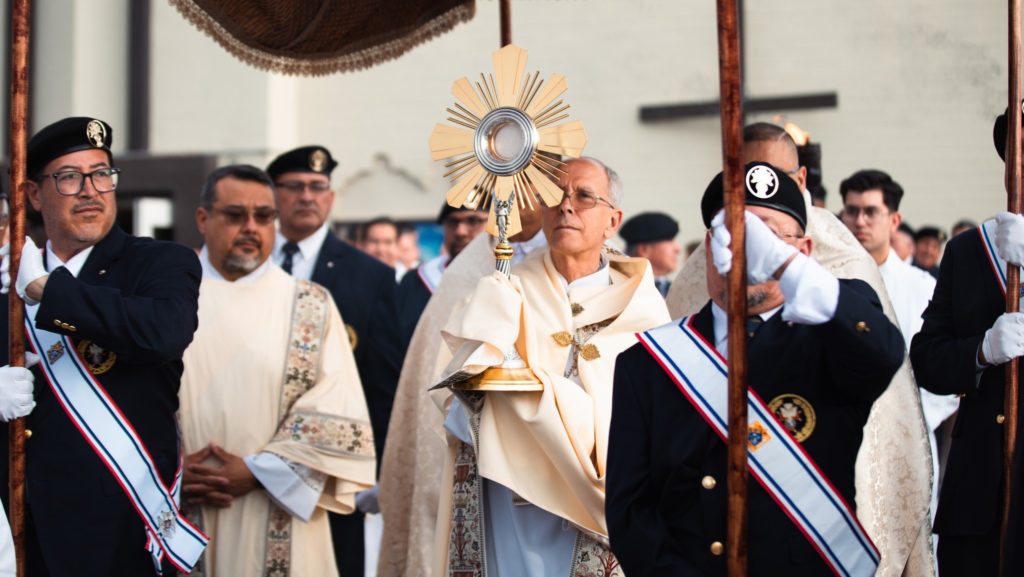The eight young adults traveling the full route of this year's National Eucharistic Pilgrimage had expected to witness their faith to inmates of James Lynaugh Prison Unit near Fort Stockton, Texas, during their June 9 visit.
Instead, those inmates showed their faith to them.
"That was probably a highlight of the pilgrimage," said Ace Acuña, one of the "perpetual pilgrims" journeying with the Eucharist from Indianapolis to Los Angeles.
The pilgrims began the week of June 8 in the Texas dioceses of San Angelo and El Paso, before entering the Diocese of Las Cruces, New Mexico, June 11. They planned to visit the Diocese of Gallup, New Mexico, June 12-13 before heading to California, stopping first in the Diocese of San Bernardino June 14-16.
The pilgrims did not have many details about their state prison visit before their mid-day arrival, Acuña told OSV News June 11. They were told the inmates had committed serious crimes, and the pilgrims were given a list of what not to bring inside, such as mobile phones and watches.
"It was exactly what you would imagine a high-security state prison looks like in the movies, like high watch towers, bar fences, several extensive security checkpoints," Acuña said. "We're going into this very prayerfully. We know we're bringing Jesus into this place, and we're still pilgrims of hope. So, even if we're a little anxious, we're going to step into this, because Jesus ... wants to liberate the captive and visit those in prison."
The pilgrims had hoped to have conversations with the men, but once they arrived, a prison chaplain told them to avoid extended interactions with the inmates. No names, she said. Don't shake hands.
Unsure of what to expect, they processed with the Eucharist in a monstrance into the prison's gymnasium, where around 100 men were seated. The pilgrims were directed to an opposite wall, unable to interact with the inmates. The monstrance was placed on a temporary altar, and a Holy Hour began.
After initial prayers, two priests and Bishop Michael J. Sis of San Angelo began hearing confessions. About 60 men lined up, Acuña said.
"First I thought they were getting up to leave," he said. "But then I realized that they were all going to confession. After they would receive absolution, they would kneel in front of the Blessed Sacrament -- like, right in front of it -- and pray. We weren't able to talk to them, but you could see that the Lord was talking to them."
The men looked "very rough," Acuña said, "but you slowly realize that that's the exterior. Their hearts are so sincere."
He said some men prayed rosaries, and others kissed their Bibles or prayed prostrate on the gymnasium floor. He saw one man kiss the monstrance, and another moved to tears after confession.
"What struck me is looking at them in their white uniforms," he said. "I was immediately reminded (of) baptismal gowns, because I'm looking at souls that have been washed as clean as the day of their baptism."
He felt "convicted" by the men's faith, he said, while being reminded of the sinful woman, recounted in Luke 7, who washed Jesus' feet with her tears and hair. "I was just thinking about Jesus' response: 'Who has been forgiven much, loves much,'" Acuña said. "And it was really humbling for me, and I'm sure for other pilgrims. … You think you're coming into serve people, but they're actually the ones witnessing to you.'"
The prison visit followed a restful Pentecost weekend, where the pilgrims took a break from participating in Eucharistic processions scheduled in the Diocese of San Angelo. Several pilgrims had been ill the week prior, and ongoing harassment from Protestant protesters during public processions had required extra fortitude.
Acuña said pilgrimage organizers wanted the pilgrims to refresh for the final two weeks of the pilgrimage, which is expected to culminate with Mass, Eucharistic adoration and a celebration in Los Angeles on Corpus Christi Sunday, June 22. He said it was a chance for the pilgrims to "spiritually recharge."
The pilgrims met the people of the Diocese of San Angelo at Mass and during meals, and found them to be especially excited about the pilgrimage passing through their towns. Then, in El Paso, about 1,000 people, including Matachines dancers, joined a June 10 Eucharistic procession, Acuña said.
As they walked for 3 miles between Mount Carmel Catholic Church to the diocesan pastoral center, people came out of their homes to see what was going on and ended up joining the procession, he said.
Acuña said that after their weekend break, the pilgrims brought renewed passion to that procession. "Even more than our first week, when we were fresh, we were just kind of bouncing off the walls, like talking to people on the street," he said.
While the protesters returned with their megaphones and slanders against Catholic beliefs, "honestly, the protesters didn't even matter," he said. "The streets of El Paso were just filled with singing."
Amid the protests, "I think our team is just really experiencing the peace of Christ that the world cannot give," Acuña said. "It's never easy to hear those things said about the Eucharist and Mary and the church, but we're keeping our eyes on Jesus even more. It's all a reminder of what we're doing."
As they prepare to arrive in the Archdiocese of Los Angeles June 20, the pilgrims are also praying for the people of Los Angeles as crowds there protest recent federal immigration raids.
"I think that it's very apt that LA is our final destination, and to bring Jesus into a place of suffering and also division -- I think it's just so needed," Acuña said. "And who better to solve these social afflictions than the Lord?"

